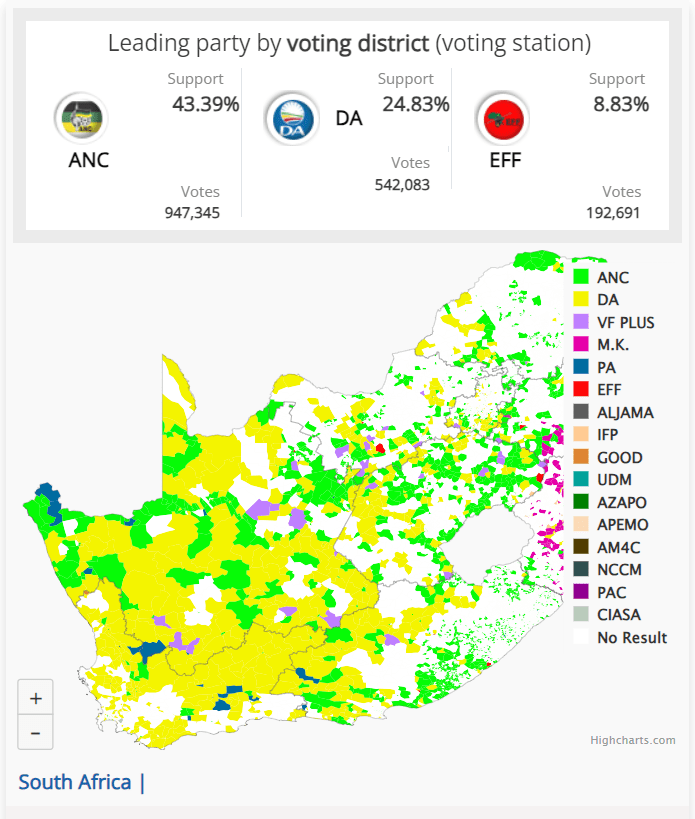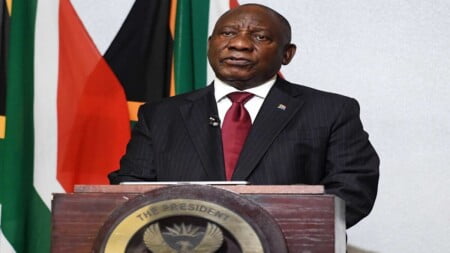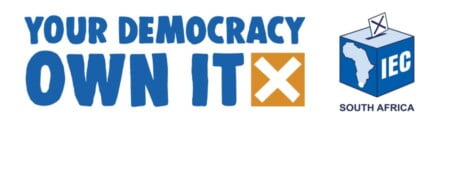The latest election results reveal a significant shift in South Africa’s political landscape. The African National Congress (ANC), which has been the dominant party in South Africa since the end of apartheid, has seen a dramatic decline in support.
Latest Election Results as they Stand
As the 2024 latest election results continue to be finalized, the current standings provide a snapshot of the shifting political dynamics in South Africa.
- ANC: 42.3% (-15.2 percentage points from 2019)
- DA: 21.8% (+1 percentage point)
- MK: 13.6% (new entry)
- EFF: 9% (-1.8 percentage points)
- IFP: 3.5% (no change)
- PA: 2.2% (+1 percentage point)
- FF+: 1.5% (-0.9 percentage points)
- ActionSA: 1% (new entry)
- Rise Mzansi: 0.4% (new entry)
- BOSA: 0.3% (new entry)
These results highlight the ANC’s significant drop in support, while the DA maintains its position as the primary opposition party. The entry of the MK Party and ActionSA into the political arena indicates a growing appetite for new political alternatives among South African voters. The EFF, while still a major player, has seen a slight decline, reflecting the shifting allegiances within the electorate.
The ANC’s Decline
The ANC’s drop to 42.3% marks a pivotal moment in South African politics. This decline is the lowest level of support the party has received since it came to power in 1994. Various factors contribute to this significant loss, including widespread dissatisfaction with the government’s handling of corruption, unemployment, and service delivery issues.
Reasons Behind the Drop
- Corruption Scandals: The ANC has been plagued by numerous corruption scandals, including the infamous state capture saga involving former President Jacob Zuma. These scandals have eroded public trust in the party.
- Economic Challenges: South Africa’s economy has struggled with high unemployment rates, slow growth, and increasing inequality. Many voters feel that the ANC has failed to address these issues effectively.
- Service Delivery Failures: Poor service delivery in many municipalities has led to frustration and anger among residents, who have turned away from the ANC in search of better governance.
Read More: Where is the ANC Leading in Votes After the 2024 Elections?
The Rise of Other Parties
Democratic Alliance (DA)
The DA remains the official opposition party, with its support relatively stable at 21.8%, an increase of 1 percentage point from the last election. The DA continues to attract voters who seek an alternative to the ANC, particularly in urban areas.
MK Party
Former President Jacob Zuma’s MK Party has made a surprising entry in the latest election results, capturing 13.6% of the vote. This new political force appears to have siphoned off some of the ANC’s support base, particularly among those who remain loyal to Zuma.
Economic Freedom Fighters (EFF)
The EFF, led by Julius Malema, has seen a slight decline, dropping to 9% from 10.8% in 2019. Despite this, the EFF remains a significant player, particularly among younger voters and those advocating for more radical economic reforms.
Inkatha Freedom Party (IFP)
The IFP has maintained its position with 3.5% of the vote. The party continues to have a stronghold in KwaZulu-Natal, where it enjoys considerable support.
Patriotic Alliance (PA)
The PA has seen a modest increase, now at 2.2%. The party has been gaining traction in various communities, particularly in the Western Cape.
Freedom Front Plus (FF+)
The FF+ has experienced a slight drop, now holding 1.5% of the vote. The party continues to attract voters from the Afrikaner community who feel underrepresented by the larger parties.
ActionSA
Led by former Johannesburg Mayor Herman Mashaba, ActionSA has captured 1% of the vote in its first national election. The party has positioned itself as a fresh alternative, focusing on anti-corruption and service delivery.
Other Parties
Several smaller parties, including Rise Mzansi (0.4%) and BOSA (0.3%), have also made their mark, although their impact on the overall political landscape remains limited.
Implications for South Africa’s Future
The significant drop in support for the ANC and the rise of new and existing parties suggest a shift towards a more competitive and potentially coalition-based political landscape. This could lead to more accountability and responsiveness from elected officials, as no single party holds overwhelming power.
Potential for Coalitions
- Coalition Governments: With the ANC losing its majority, coalition governments may become more common, requiring parties to work together to form stable administrations.
- Policy Shifts: Coalitions could lead to policy compromises and shifts, as parties negotiate to address their constituents’ concerns.
Increased Voter Engagement
The emergence of new parties and independent candidates indicates a growing engagement among voters, who are seeking alternatives to the traditional political options. This trend could lead to a more vibrant and dynamic political discourse in South Africa.
The latest election results mark a turning point in South African politics. The ANC’s decline to 42.3% reflects widespread dissatisfaction with the party’s performance, while the rise of new and existing parties suggests a move towards a more competitive political environment.
As the final results, including the regional ballot, are confirmed, South Africans will be looking to their leaders to address the pressing issues facing the country and to build a more inclusive and prosperous future.










